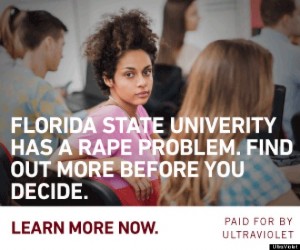UltraViolet, an erumpent feminist coalition, targeted Dartmouth in late April with Facebook ads alluding to The College’s “rape problem”. The advertisement asked viewers to “learn more,” implying that a veiled rape culture exists here.
College spokesman Justin Anderson called the ads “unfortunate,” citing that they failed to “acknowledge the actions Dartmouth is taking,” most notably the recent policy proposal making expulsion mandatory for the most egregious cases of sexual assault. To correct the misinformation, Dartmouth launched its own advertisement campaign directing viewers to a webpage detailing administrative steps against sexual assault.
It appears, however, that the ads targeting Dartmouth were little more than the first salvo in a wave of aggressive advertisements from UltraViolet targeting prospective college students across the nation.
Using the same three photos and handful of sentences while simply replacing the names of the schools, UltraViolet ads are now targeting Harvard University, Occidental College, the University of Michigan, Florida State University, and the University of California-Berkeley. All of the incriminated colleges are already undergoing Department of Education investigation regarding administrative handling of sexual assault cases.
The targeted colleges have reacted in sundry ways, mostly similar to the way ours reacted. For example, University of Michigan spokesperson used the same words our Justin Anderson did when reacting to UltraViolet’s thrust against his school’s reputation. Rick Fitzgerald, the spokesperson, declared the ads “unfortunate,” citing that his university “meets or exceeds nearly all of the recommendations” announced by the recent White House task force on sexual assault.
Online ads from UltraViolet will appear in search results if it appears a user may be applying to a school, on mobile ads when people are at locations near the campuses, and on Facebook based on aggregate data that suggests a person is considering attending one of the colleges targeted.
Why UltraViolet doesn’t attack the other 49 colleges under federal inquiry has not been publicly revealed. But, it is easy to see that the group accomplishes two tasks with their smear campaign: first, they alert prospective students, and second, they hit colleges where it hurts by damaging their reputations. This second task may be the reason why UltraViolet hesitates in unleashing ads against the 49 remaining colleges. UltraViolet, in an effort to save money on expensive advertisements, may be going after the colleges that stand to lose the most in reputation. As an Ivy League school with a recently publicized 14% drop in applications following a tumultuous two years, we fit that criterion pretty well.
Or, the group may have simply not yet arranged to hit the next 49 schools.
According to Tyler Kingkade of Huffington Post, UltraViolet plans to spend “tens of thousands of dollars” in the coming months on their hell-bent campaign to end college sexual assault. However these dollars manifest will probably be interesting and almost definitely involve some angry lines about Dartmouth, among other colleges.
UltraViolet is also pressuring The Princeton Review, the bestselling college rankings company, to include statistics on sexual assault within their preexisting ranking rubrics. The group had this to say:
Countless high school seniors and their parents consult the Princeton Reivew school rankings each year. It grades schools on everything from quality of life to class size to fire safety, but it includes nothing about sexual assault. If the Princeton Review starts including information on campuses’ sexual assault track records, the public statistics will motivate colleges across the country to get serious about the epidemic of campus rape.
UltraViolet wants to accomplish the following four goals: make expulsion the punishment for rapists, provide consent education for all students, make resources available on campus to allow survivors to press charges, and make it so students can change their class schedules and housing to avoid reported abusers.
No one can doubt the righteousness of these goals or deny the rationality behind the notion that these gruesome sexual assaults will continue if they are left unattended. But rape is a complex, societal problem that transcends the purview of activist groups and even college administrators. So as more and more opinions enter the fray, including those belonging to senators and celebrities and presidents, it is imperative we refrain from getting so tangled in the battle lines that we forget the gentle, wounded voices of the victims.


Be the first to comment on "UltraViolet Attacks More Schools"